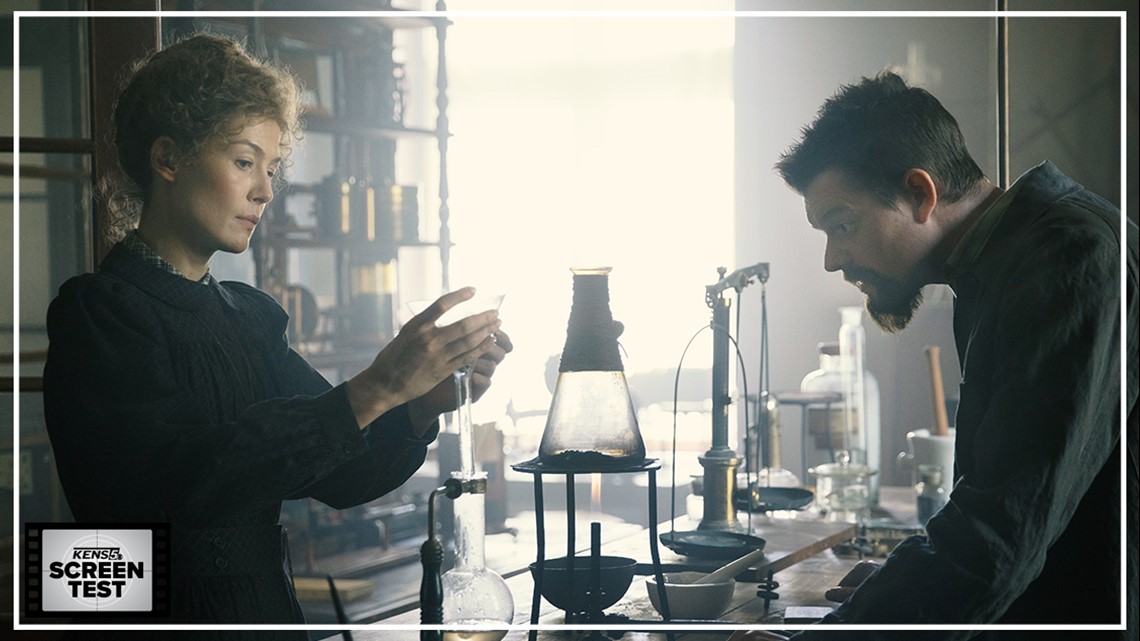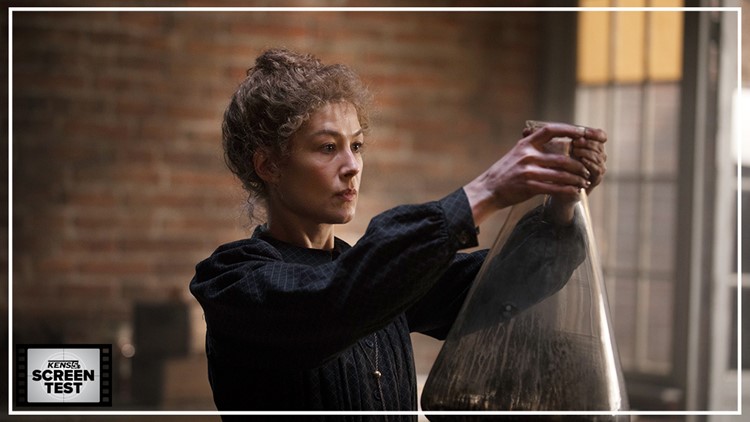There’s an unfortunate irony that settles in about 20 minutes into the new movie “Radioactive,” as beakers are filled and measurements are taken in a 19th-century lab, that the film itself feels processed from the theorems and methods of faux prestige filmmaking. I know what you’re thinking: that’s far too easy and reductive an observation to make. Allow me to counter: “Radioactive” – by most measures another standard operating biopic, and by some an even less worthwhile experience – makes it far too easy for the observation to be made.
Hollywood just can’t resist rummaging through world history and skimming iver the names of historically relevant figures that can become the basis of full-length movies. The latest name to be plucked out of the hat is Marie Curie, a groundbreaking Polish chemist and the first woman to be awarded the Nobel Prize after making her name in a field dominated by men. Known as the “mother of modern physics,” Curie’s research of polonium and radium would lead to innovations in healthcare and in wartime, even as it was also eating away at her cells, eventually leading to her death. The appeal for the biopic treatment isn’t hard to see.
But while “Radioactive,” the first film by Iranian director Marjane Satrapi in five years, is clearly interested in the life and accomplishments of Curie, it’s at a loss for how to memorably balance them. Though the boilerplate biopic (between “Judy,” “Bohemian Rhapsody” and “The Theory of Everything,” those two words seem to have been paired up with annoying frequency as of late) is just a tick under two hours, it bears a distractingly broad gaze—its story spans decades and its ripples of implication extend so far beyond Curie that she starts to feel like too small a figure in her own story. There are some welcome doses of surreal character exploration here and there, but the movie loses itself in an ambition and scope better fit for a TV project.
A few years removed from her Oscar-nominated role as a conniving marital partner in “Gone Girl,” Rosamund Pike here plays a woman equally as entangled in suffocating gender politics and assumed domestic roles. Except “Radioactive’s” earliest chronological scenes (the movie is framed as Curie flashing through memories while on death’s door in 1934) date over a century prior to David Fincher’s twisted tale, cuing up battle-of-the-sexes tension that bubbles over the moment Pike’s self-determined Curie bursts into a meeting of research overseers who are, obviously, all men. The young scientist is upset that her lab equipment has been shuffled around; more important, she demands to be taken seriously by her colleagues. The tropes show their wrinkles, even as they’re justified by history.
Naturally – with the same practicality a scientist applies to their work – she’s promptly evicted from the labs she was working out of. The rules of the period are practically an excuse for the movie’s lack of subtlety, which the movie unabashedly cements when Curie says, “I’m interested in all science that confronts prevailing attitudes.”
And thus, so are we. That may be an overly tidy thesis statement, but it’s one that ably positions “Radioactive” as the story of a singularly obsessive mind overcoming dogma en route to radical scientific epiphany.
It’s confusing, then, that “Radioactive” chooses to sprint through foundational segments of Curie’s life to define her largely by the consequences of her discoveries, which would be numerous. In one scene, “Radioactive” jumps several years into a weary future where the Enola Gay drops the world’s first atomic bomb onto Hiroshima—this terrifying new element of warfare has been made possible by Curie’s discovery of new elements, it seems.
The implication is clear, and there’s certainly room to admire how the film’s screenwriter, Jack Thorne, attempts a bit of narrative bravura by tying one person to world-shaking events. But the execution is more jarring than dramatic; the thrust of the Hiroshima sequence is undercut by knowing that while we can be horrified and even made morally suspicious of the form Curie’s discoveries will take on, there is no way she herself can in the moment. Pike’s Curie is still stuck in a moment in time decades earlier, contemplating events that have not yet happened. Legacy takes priority over any kind of personality in “Radioactive,” making it more effective as a high-budget, live-action “Magic School Bus” episode than a captivating piece of filmmaking. Visually, it even has an unfinished look to it—daytime scenes are washed out, though nighttime vignettes appropriately evoke the potential of the Victorian Era.


The film engages in its timeline ping-ponging more than once, and the screws of coherency are loosened each time. The way the story pulsates between the micro and the macro of its events – historically, narratively, tonally – disorients us more often than not, taking time and space away from exploring Curie beneath the surface. That’s all despite an enthusiastic Pike doing her damnedest to help us be as interested in her character as we’re encouraged to be in her science. There’s some shoddy character development at work here; so often the point we realize character traits and motivations only when they’re divulged out loud, making me feel like I was expending too much energy in keeping up with the story to actually be hooked by the story.
It’s all too tempting to see this version of “Radioactive” as a compromise between the story I think Satrapit would like to tell, and the one offered up by Thorne’s script. We watch Curie take on an increasingly active role in ensuring her name is marked in history, but the weight of that history comes to overshadow her; characters are no more informed by their actual character than by the period-accurate details of the costumes and production design of iron and shadow. “Radioactive” tries to connect the dots between the tilt of a beam balance and the plunge of an A-bomb, but in that jumbled effort it fails to illustrate the woman who made the connection in the first place.
"Radioactive" is rated PG-13 for thematic elements, disturbing images, brief nudity and a scene of sexuality. It begins streaming on Amazon Prime Video Friday.
Starring: Rosamund Pike, Sam Riley, Yvette Feuer, Anya Taylor-Joy
Directed by Marjane Satrapi
2020
MORE SCREEN TEST REVIEWS
- ‘Carmilla’ Review: Gothic coming-of-age drama echoes the highs of modern horror without finding its own path
- ‘The Old Guard’ Review: Netflix’s comic book action-drama is a character study that shows what we’ve been missing
- ‘Greyhound’ Review: Tom Hanks stars in one-trick World War II drama honoring heroes of wartime past and cinematic present
- ‘Palm Springs’ Review: Andy Samberg and Cristin Milioti star in 2020’s most unexpected pandemic-era allegory
- ‘Desperados’ Review: Netflix’s latest will take you through the seven circles of cliché hell
- 'The Truth' Review: Catherine Deneuve shines in Hirokazu Kore-eda's drama about family, memory and narrative
- ‘Eurovision Song Contest’ Review: Overlong Will Ferrell-Rachel McAdams comedy is enjoyable when it leans into the outrageous
- The best movies from the first half of 2020
- ‘My Spy’ Review: Dave Bautista’s talents are wasted in uninspired genre mashup
- ‘House of Hummingbird’ Review: Tender South Korean drama finds empathy in harrowing moments of teenagerdom
- 'Babyteeth' Review: Familiar coming-of-age narrative is given reinvigorating new life in Shannon Murphy's directorial debut



